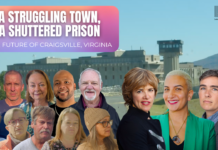MacKenzie Scott, ex-wife of Amazon founder Jeff Bezos, recently made a splash by donating nearly $3 billion to more than 280 nonprofits working in historically underfunded sectors – her third such drop in a year. But while Scott has repeatedly made headlines, the media has largely overlooked the impact that women and feminists are making on philanthropy during a pandemic that has created a global crisis for women and girls. How does feminism change the field of philanthropy in general, and how does it change the landscape for social justice movements specifically? In this episode, Laura interviews the writer and activist V, formerly known as Eve Ensler, about the effects of what she calls “disaster patriarchy.” Then, Laura goes in depth with Theresa Younger, CEO of the Ms. Foundation and member of the White House Gender Policy Council, to explore how tying the intersections of race and gender into philanthropy could make a better world for us all. Plus, Laura makes some predictions about the Right and the new Child Tax Credit.
Guests
- V (formerly Eve Ensler), Playwright, Author and Founder V-Day and One Billion Rising
- Teresa C. Younger, President & CEO, Ms. Foundation for Women
To listen to the uncut interviews, and to get episode notes for this episode and more, become a Patreon partner here.
Prefer to Listen?
Transcript
THE LAURA FLANDERS SHOW
GENDER JUSTICE REQUIRES MORE THAN MONEY SAY THE FEMINISTS TAKING ON PHILANTHROPY DURING COVID
LAURA FLANDERS: Many social ills were made worse or more visible by the COVID-19 epidemic, among those racial, gender, and class inequities. At the same time, the very rich got very much richer, and demands for justice got louder, and some individuals gave away record-breaking amounts of money through private philanthropy this year. In June, 2021, 286 nonprofits received big grants from MacKenzie Scott, one woman, the ex-wife of Amazon founder Jeff Bezos. This summer’s drop, Scott’s third in a year, was worth almost three billion dollars, that’s with a B. So what’s all of that funding do? How does it change the field of philanthropy in general, and how does it change the landscape for social justice? This time I’m talking with one of the very few African American women at the head of a longstanding public foundation. Teresa Younger is President and CEO of The Ms. Foundation, which last year released a report showcasing the drastic need to hold philanthropy accountable to communities and social movements, and the changes that they seek. Teresa Younger is also a participant in the White House Gender Policy Council. At the end of this show, I’ll have a few thoughts about the Child Tax Credit, but first, we go to V, the artist and activist formally known as Eve Ensler, who recently wrote a blistering account in “The Guardian” titled “Disaster Patriarchy,” detailing how, as she put it, the COVID pandemic had unleashed a war on the world’s women. I’m happy to welcome back to the show my friend, V.
Welcome back, welcome to “The Laura Flanders Show.” “Disaster Patriarchy,” talk about the contours of this disaster, as you see it, and why was it so important to you to name it in the way that you have right now?
V: Before I jump into this, I just want to make my terms clear so everyone knows that they’re included. When I speak of women, I’m speaking of cis gendered and gender diverse, and when I say racialized patriarchy, sometimes I’ll say patriarchy, sometimes I’ll say racialized patriarchy, but I’m always meaning racialized patriarchy. It all started with “The Guardian” asking me to do a piece for their 200th year anniversary, isn’t that amazing, looking at violence against women post-COVID. So I started to really read, investigate, and interview many, many activists from around the world. And what I began to see was that COVID had unleashed truly the most severe setback to women’s liberation in my lifetime. And I think going back to Naomi Klein, who was the first to identify disaster capitalism, when capitalists use a disaster to impose measures they couldn’t get away with in normal times, generating more profit for themselves, I think, I would say, and I haven’t coined this phrase, it has been used by other people before me, but disaster patriarchy is a parallel process where men seem to exploit a crisis to reassert control and dominance and rapidly erase hard-earned women’s rights. All over the world, patriarchy has taken full advantage of this virus to reclaim power, on the one hand, escalating danger and violence to women, on the end, stepping in as their supposed controller and protector. And I really talked to women in all throughout Africa, I talked to women in India, I talked to women throughout Europe, in Latin America, and unfortunately, this story seems to be pretty much the same worldwide.
LAURA FLANDERS: I mean, I urge people to read the article in “The Guardian,” we’ll link to it at our website. You talked to people from Peru, from France, but also here, and also here, I should say, in the United States. Will you remind us that women have been, women and girls have been both celebrated and praised as essential workers and seen as entirely expendable? And one of the things you say is you don’t know whether to be more upset about the behavior of the men and government, or the inaction, especially, of government.
V: One of the things that really horrifies me is here we have these conditions, right, where we have learned over time that if you put people and lock them in a house together with no money, with radical lowered self-esteem because men don’t have work, being cramped up all day long with children who they’re really worrying about not being able to feed or take care of, right, violence and anger escalates, right? I mean, you take alcohol and you add that to the abuse, we know there will be further escalation. The statistics we’re seeing now in the US, in France, in Peru, in Spain, in Italy, I mean, name a country. The escalation of domestic abuse is off the charts, and we don’t even know the half of it yet because we’re not gonna hear the reports of how many children were sexually abused, how many children were tortured. All of this, and not one government thought about the possibility of this.
LAURA FLANDERS: So when the going gets tough, we put all the load on the women, but then in a moment like this where we’re supposedly entering recovery, getting back to normal, there’s no help for those women. So what are the world’s women that you know calling for?
V: Well, I think everybody’s calling for the same thing, to honor women. First of all, let’s look at the amount of work that women are having to do, right? There are loads of childcare, feeding, teaching, that’s never been work that’s been paid for, that’s not paid labor. Why isn’t that paid labor? Those women are keeping families alive. My sense everywhere was that women should be being paid for this and supported in doing that. The second thing is that shelters or some kind of understanding that women are caught and need a place to go, I mean, in many places, shelters have shut down, right, at the exact moment when they were most needed. Everyone says, “We love women, we need women, we can’t live without women,” and yet no one’s willing to pay or support those women who are doing the critical work.
LAURA FLANDERS: And there’s lots of states where under the auspices of the COVID crisis, they withdrew access to abortions and the ability of clinics to actually provide abortion access, which is a whole nother story. You go further, though, in your article in “The Guardian.” You call for a martial plan-size fund to help the world dismantle patriarchy, which, while I love the idea, I want to know what it would look like, and I’m sure you’ve dreamt of exactly that.
V: I think part of it is educating people and looking at, what is patriarchy? What does it mean that we are living inside a system, right, that is based on a very few people having all the goods, all the money, all the power, and determining life for everybody else. We need to educate, we need forums, we need art that expunges trauma and grief and aggression and sorrow and anger in the culture. We are constantly forgetting what we are learning, right? We are constantly forgetting our history. We only have to look at what’s happening right now in terms of the pushback against critical race theory or anti-racism training, the desire to not know our history, to not know where we come from, because then you can continue on with the same behavior. There is a mindset we are currently ruled by, it is called patriarchy-
LAURA FLANDERS: Racialized patriarchy.
V: Racialized patriarchy, okay? This is the system, this is the bubble we are under. It’s only 17,000 years old. There were systems before and there can be systems after. How do we begin to create those systems, and what would they look like? Every single activist I talked about said that until this systematic racialized patriarchy that we live in is dismantled, we’re gonna keep going back here, right? We’re just gonna keep… ’cause that’s what people fall back to because it’s trained into their DNA.
LAURA FLANDERS: Thank you, V, it’s really an important call to arms. I loved seeing your piece, I’m glad it was in there, and it’s a joy to be able to bring it to more people. I appreciate it.
The world looks different after COVID, but not anywhere near different enough, say a lot of us. What would a reimagined, new, more equitable society really look like, and what do we need to do now to get there? Joining me to pick up this conversation is Teresa Younger of the Ms. Foundation.
I’m sure that in lots of ways, you share V’s dire sense of the situation that we’re in. But how would you describe the sort of parameters of this moment?
TERESA YOUNGER: This moment is actually no different than any other moment yesterday, or any other moment in 2019 or 2014 or 2008. What this moment is is a flashlight on all of the societal ills and the trickle down effect that they have had on women and their families throughout the United States and across the globe.
LAURA FLANDERS: So that brings us to the op-ed that you wrote with Joy Anderson, the President and Founder of the Criterion Institute, where you talked about this moment as maybe not new, but as a moment of opportunity. And you began that by imagining a world where we took the temperature of our economy differently, how?
TERESA YOUNGER: Well, I think we have continued to assume that success in this country is about how the markets look, and those markets were developed by white men hundreds of years ago. They were not developed in line with women, women and girls of color, trans folks, gender nonconforming folks, LGBT folks, none of those folks were in the conversation. Women in general were not in the conversation. So why are we going back to the same systems that have continued to fail over half of our society? How do we see this as an opportunity to actually start analyzing the systems? And maybe we shouldn’t just assume that finance and capitalism are the only ways to measure success in our society.
LAURA FLANDERS: What would that look like? I mean, you are there on the White House Gender Policy Council. There’s been discussion of universal preschool, childcare, investing in all of these kinds of policies, including senior care and so on, but very little flesh on the bones, very few bits of data, and in an op-ed just recently in “The New York Times,” Bryce Covert, who writes about these things, says many of the Biden plans are out of date.
TERESA YOUNGER: The Gender Policy Council is the White House’s attempt to look inside and to align the gender assessment analysis with a race lens and a disability lens from inside. It’s looking at both a global as well as a domestic alignment for what the administration might want to be doing. And so I’m not sitting on the Council, I’m sitting with the Council to be part of a conversation that they need to have, and we’re looking at that from a multitude of spaces and places. They are actually doing a listening analysis of what needs to happen, they are looking at research and data that’s being collected across all different kinds of departments and are asking folks, “What do you think needs to be collected, how do we recenter the information? How do we provide consistency in what we’re doing? How do we break down that data?” And I would say that so many of the Biden administration policies or proposed policies may be a little outdated, but they’re further than we have been in a long time. I mean, we actually have, in this country right now, a Childcare Tax Credit that allows for families to get tax credit. We have for the first time, nonprofits can apply for payroll tax credits. We have a conversation going on, maybe stagnated now, about the determination of what infrastructure looks like. We’re having real conversations about what a care economy looks like, not just from the perspective of childcare, but what it looks like to care for our elderly community members —
LAURA FLANDERS: And you have confidence that this conversation is headed towards the kind of systemic change that you have in mind? Because to a lot of us on the outside, it still looks super temporary and a little bit moderate in tone.
TERESA YOUNGER: Here’s what I have confidence in. We’re having a conversation that we have not legitimately had before. And sometimes it’s just asking the question that gets everybody uncomfortable. So do I believe in this one term, with a defunct Senate, that we’re gonna get these policies passed? Maybe not, do I think that state legislatures have an opportunity to implement some of these pieces, and we can recreate what that looks like, possibly. But I’m also absolutely disheartened that we can’t get a voting rights bill through, and I’m absolutely disheartened that we are looking at spending trillions of dollars on infrastructure reform, and we can’t decide on what that should look like. And we only want to go back to what it has been, it’s roads and trains and planes, it’s bridges, but we actually need to have a real conversation, what does it take to live in our country, to thrive? Why do we always talk about minimums from the basement? Why don’t we talk about it from the midpoint?
LAURA FLANDERS: That takes us to movements, and you wouldn’t have been all these years in philanthropy and social justice if you felt that change happened overnight or with one administration.
(TERESA YOUNGER): That’s right.
LAURA FLANDERS: So let’s talk about that, you mentioned trillions, trillions of dollars are moving at this moment, and we’ve seen something like nine billion move from just one source, MacKenzie Scott in the last 12 months. On the one hand, this is fantastic, going to such social justice groups, responding to the demands of groups like the movement for black lives. But you were part of a large group of philanthropists from public philanthropies, public foundations who wrote a letter to philanthropy as a field, raising some concerns. You said on the one hand this is great, but it wouldn’t be great if we didn’t do it right. So can you lay out your concerns about this, while, of course, it’s fantastic to see money shifting?
TERESA YOUNGER: Well, I think one of the things we need to lift up is that public foundations like the Ms. Foundation raise our dollars. We are committed and responsible to the grassroots that we are serving towards the missions that we are trying to achieve. When we see gifts like MacKenzie Scott, which are based in trust, she is making those gifts with no strings attached for a limited period of time, and saying to nonprofit groups on the ground doing this work, “You spend this money how you see fit.” But what we have to understand is that money, many nonprofits, social justice movements in this country are completely underfunded. And instead of also… sometimes people feel like they have to do it their way, we actually know, public philanthropy actually knows how to service our communities, and we have actually been formulating deep relationship with movement structures for a long time. So that letter that we wrote in conjunction with what I consider some of the best thinkers in public philanthropy was really about questioning the fact that why do we always need to start something new and make things hard? Why don’t we learn and listen to those who have been moving money to the field, those who have a social responsibility to have an impact, and that we are listening to the grassroots?
LAURA FLANDERS: And in this moment, it seems as if a lot of women, single heads of households, professionals leaving work to look after kids, suffering the consequences of that gap in their professional career, but there are a lot of women who are not leaving the workforce, who never did during this pandemic, how do you serve all of these interests?
TERESA YOUNGER We’re starting the conversation at the Ms. Foundation by centering women and girls of color as our starting point. And we believe that in the pool of inequality, if we can drop one stone over one thing, it’s gonna be women and girls of color, and the rippling effects will come across so many different folks who are in that pool of inequality, whether it’s with disabilities, whether it’s trans, whether it’s men. It can be anybody, but we’re gonna start there as a point ’cause it changes the conversation. So much of our conversations have centered around white males, and even when you move women into that conversation, it has traditionally not been about women and girls of color, has not been about Black women and girls. And how do we change what’s happening in our society? We have to address the centering conversation that we’re looking to have an impact on.
LAURA FLANDERS: I want to come to the research that you actually did a year ago, speaking to movement groups about the form of accountability that they’re seeking, and the stresses that they’re feeling ’cause a lot of people think, “More money, more money is good, period,” not always the case.
TERESA YOUNGER: Money has to be consistent, and in our new report that we put out last year called “Pocket Change: How Women and Girls of Color are Doing More with Less,” we actually did an analysis of what is happening in the field. And what we heard from those who are doing work is, more times than not, there’s always this, it’s like voter fraud, in some ways, there’s always this assumption that the dead person is voting, right? There’s always this assumption that nonprofits led by women of color are stealing money from the top of the game, they are not. And what we found was, we need, philanthropy needs to be specific, they need to name what they are doing, they need to track what they are doing, and then they need to increase the amounts of money. So one of the things that’s both consistent with the report and with the letter is this idea that we need to fund organizations over time, not on a year-to-year basis, but on a multi-year basis because what we see is the stress of having to do that draws the attention away from getting the outcomes on a day-to-day basis that we need to see in our communities.
LAURA FLANDERS: Let me ask you to just really underscore the difference between private philanthropy and public, and I care because it models a little bit the reality in public media, we raise our own money, we’re accountable to our audience, versus somebody who has a bunch of bucks and puts on a TV show or a new shiny object in the media stratosphere, a new app or so forth.
TERESA YOUNGER: We are accountable to the communities that we serve. We are accountable to being explicit about what we are trying to do and how we are trying to do it. Many public foundations are also accountable to deep relationship, we don’t just get to, on a whim, change our minds about what we want to do, how we want to do it, and impact we want to have, and we are looking at generational change. We’re not looking for day-to-day wins that we can just check off on a piece of paper. Private philanthropy, on the other side of it, has regulations about, they have to spend 5% of whatever dollars they have, they have to give it away. 5% of a million, a billion, 16 million is a lot of money, but why should they be sitting on the other 95% that they’re not spending? Where many public foundations are, if we have endowments, we have smaller endowments, we are spending above and beyond 5%, most of us are at 7% or 10%. We are raising on an annual basis the dollars we want to move to the field. We are performing an education to those that are in conversation with us. Many public foundations, including women’s foundations in this country, are about building collective power, and we’re having open and honest conversations about that.
LAURA FLANDERS: We typically end these conversations with a question about what it is that gives you not just confidence, but a taste that these enormous changes that we’re talking about are possible. We’ve talked for years about another world is possible. Was there ever a moment in your life or an interaction or a person in whose company you felt it was palpable?
TERESA YOUNGER: In this role, as well as in state government, which is where I was before I was with Ms., every day I interact and engage with folks that I believe believe in a future that is common. And at my core, Laura, I am a Girl Scout. I believe in making the world a better place. Everything I am doing is about making the world a better place, leaving this world better than I found it, and I come across people every day who believe that. And many of our grant partners who have been doing this work year after year after year are looking at this moment in time and recognizing it is different. Seven years ago, we would not even acknowledge a conversation about race, even though we had a Black president, and today we are in the midst of conversations about race, gender, class, equity, in these conversations. And I have to say, that allows me to think that also the next generation of young people understand what that world could look like, and they’re willing to ask the questions about it.
LAURA FLANDERS: Well, Girl Scout that you are, thank you so much. That has left us on a very good, positive note, and we should point out to people that the great thing about public philanthropy and public foundations is the public can actually contribute to them, just saying. Teresa Younger, thank you so much. It’s been a pleasure talking with you.
TERESA YOUNGER: It’s been a pleasure, thank you so much.
LAURA FLANDERS: I’m gonna go out on a limb here and say that no American family can reasonably survive on $300 a month. But I’m also gonna predict that the American Right are gonna come after the Child and Dependent Care Tax Credit program, and say it’s giving too much to too many too fast. Let’s just take a look. Under the White House proposal, starting this July, any family with two earners earning less than 400,000 or one earning less than 200 is gonna receive a tax credit, or a direct payment worth about $250 to $300 per month per child. What’s it likely to do, reduce child poverty by half. What’s the right likely to do, attack it. What we are likely to see is progressives on the defensive, when what we really need to be doing is looking at where we stand, the US, in relation to every other, just about every other Western wealthy nation. Every country you can think of, France, Germany, Denmark, Switzerland, Finland, you name it, they all have a program like this. So the real question isn’t why is this so much so quickly, but why have we waited so long, and what can we do to make this tax credit program permanent? That’s it for me, ’til the next time, stay kind, stay curious, and thanks for joining us.
For more on this episode and other forward-thinking content and to tune into our podcast, visit our website at lauraflanders.org, and follow us on social media @TheLFshow.
Want More Gender Coverage?
You can find more LF Show coverage on gender here.
Accessibility
The Laura Flanders Show is committed to making our programming, website and social media as accessible as possible to everyone, including those with visual, hearing, cognitive and motor impairments. We’re constantly working towards improving the accessibility of our content to ensure we provide equal access to all. If you would like to request accessibility-related assistance, report any accessibility problems, or request any information in accessible alternative formats, please contact us.
















